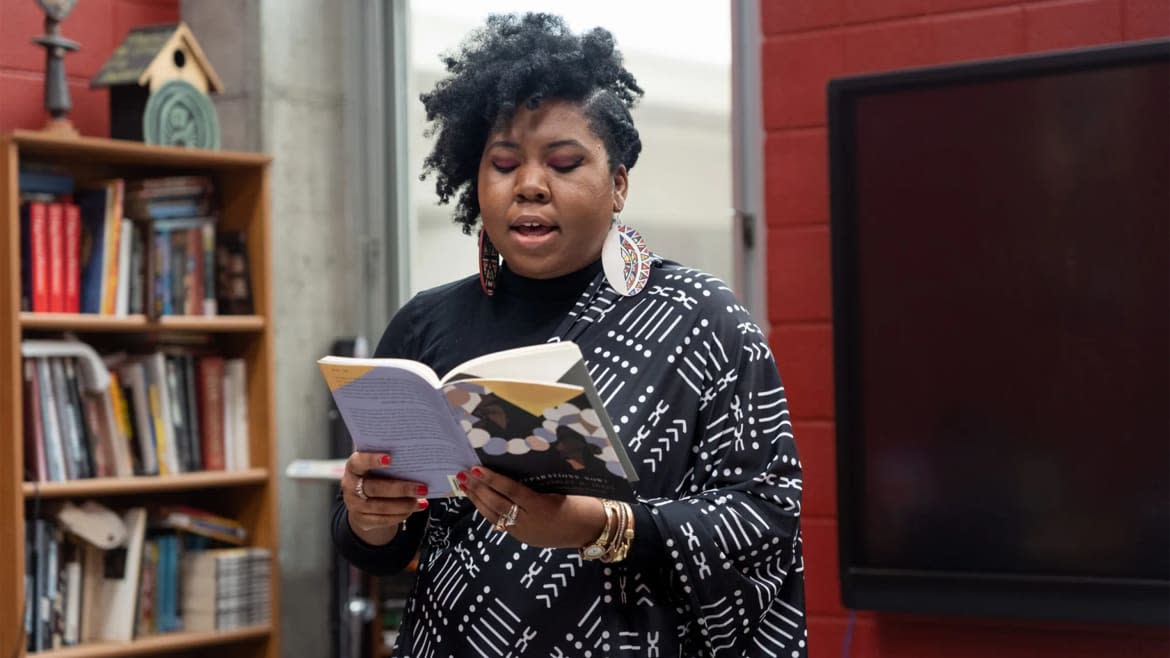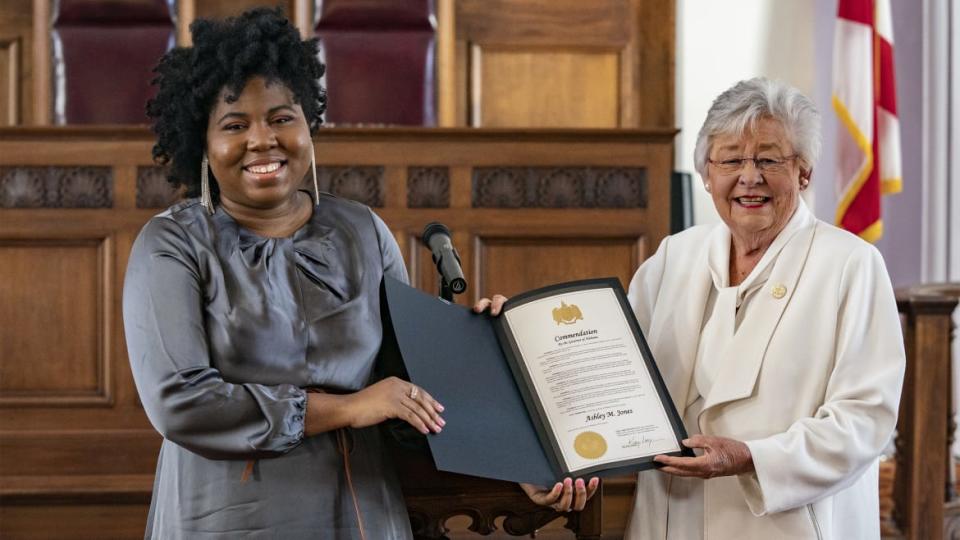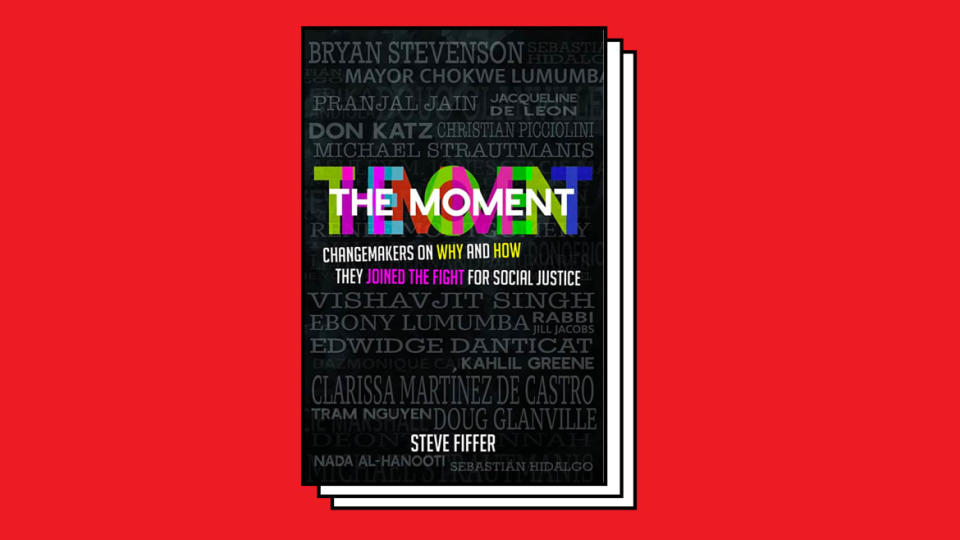Alabama’s First Black Poet Laureate Makes Words Her Weapons in the Fight for Social Change

This is an excerpt from the book The Moment: Changemakers on Why and How They Joined the Fight for Social Justice, edited by Steve Fiffer and published by NewSouth Books. The author of more than a dozen books, Fiffer most recently collaborated with the late civil rights icon Dr. C.T. Vivian on his memoir, It’s in the Action. For The Moment, Fiffer interviewed more than 35 activists of all ages, backgrounds, and professions. Among those featured “in their own words” are Bryan Stevenson, founder of the Equal Justice Initiative; Michael Strautmanis, executive vice president of the Obama Foundation, and award-winning author Edwidge Danticat. Excerpts featuring Jackson, MS Mayor Chokwe Antar Lumumba and Professor Ebony Lumumba, Zev Shapiro, Renee Montgomery, Doug Glanville, Don Katz, and Christian Picciolini appeared here previously.
Ashley Michelle Jones, 32, is a poet, instructor of creative writing at the Alabama School of Fine Arts and Converse University Low Residency MFA, and the first Black Poet Laureate of Alabama (2022-2026). She is the youngest person to hold this position. Her works deal with race and history inspired by Alabama's historical enslavement of Black men and women in the Deep South. She is the author of Magic City Gospel, dark//thing, and Reparations Now! Born and raised in Birmingham, Alabama, Jones founded the Magic City Poetry Festival. She holds an MFA in Poetry from Florida International University.
You look at the history and wonder: What would I have done? Would I have been one of those children marching in Birmingham in 1963? Would I have marched over the Edmund Pettus bridge from Selma to Montgomery in 1965? I never really knew what that would look like for me. I am very anxious around police or any sort of dangerous situation.
And then in 2020, George Floyd was murdered and everyone mobilized. Luckily, I had just taught March by John Lewis. And I thought, Okay, this movement had so many pieces to it. We, of course, see the images of those who were on the ground doing sit-ins and protesting, but there was a whole network of people making sure the structure was there. People working in offices, writing letters, getting food together. So I figured out that where my strengths lie in the movement are with my writing and with my ability to organize people around a cause.
I was totally aware of my history from an early age. My dad was part of a school integration growing up in Bessemer, Alabama. My parents made sure that we interacted with Blackness all the time. My dad painted a Santa Claus brown because we couldn't find one in the stores. We were allowed to imagine our God looking like us.
The WNBA Star Turned Team Owner Who Found Her Voice
I've been writing poetry since I was seven. The poem that turned me toward that is called, “Harriet Tubman.” It's by Eloise Greenfield and is from a book called, Honey, I Love. I love that book. It’s sort of radical because it celebrates Black existence, Black joy. So my beginning was reciting this piece about Harriet Tubman, who freed so many slaves. And from there I started writing poems about everything, including racism.
I went to a fine arts high school in Birmingham where there weren’t that many Black students in my department. I got away from writing about social issues for a while. I was just trying to sound like the other kids basically. But then I read Rita Dove's Selected Poems.
Reading that book showed me that I could write about my own people. Then in college, I found my poetry patron saint, Lucille Clifton. Her work pushed me even further back into my authentic self. So it was finding people who were like me and understanding that they gave us permission to write about ourselves. As people of color, we have to do that on our own because we don't necessarily get that in the traditional education system.
I knew that poetry had some changing power for me personally, but it was really at the end of graduate school in South Florida when I cemented the idea that it could effect social change. I was working with young people in a spoken word project and saw this was making a change in their lives. I could see in them a sort of confidence being born as they wrote, instead of just reading other people's words. Having the opportunity to speak and be listened to. I started to understand that it’s really important for any child, but especially for children of color, to feel like their opinions matter and that people will listen to them.
When I came back home to Birmingham, I started working with a wonderful worldwide program called One Hundred Thousand Poets for Change. On the last Saturday of September, we have an event where people share poetry that has a social justice theme. In Birmingham, we added an element where we do fundraising for organizations.

Governor Kay Ivey hosted a ceremony in the Old House Chamber in The State Capitol for the incoming Poet Laureate for Alabama Ashley M. Jones on Dec. 1, 2021 in Montgomery, Alabama.
Using poetry to free people
One year we worked with a group involved in immigrant justice. They were trying to get people out of the Etowah County Detention Center, which is one of the worst in the nation. We had two events where we were reading poems about justice, and we had one of the organization’s representatives read some letters from people who were detained.
After this event, we were able to raise over one thousand dollars—enough to help free somebody from the detention center. Incredible! For me, it was, OK, I was right. I knew that poetry could do something. And here, now, I had something tangible. Our words changed people's hearts to give money and to change someone's life to let them go free.
Since then, we've kept raising money. I wish we didn't live in a society where money meant anything, but because it does, we're going to use our art form to help free people or to help in other ways.
Also since returning I started a nonprofit, the Magic City Poetry Festival. In 2020, we did a fundraiser where if you show us the receipt for a donation you made to a liberation or human service organization, we’ll write a poem for you. So this is where I’ve really found myself in being an activist.
I write poems on many subjects, including myself and historical pieces. With some poems, I've had to understand the moment I’m writing about. In my first book, Magic City Gospel, there are a lot of poems about the Civil Rights Movement. I immersed myself, watching videos of Bull Connor at the Children's March in Birmingham or of the segregationist Alabama Governor George Wallace. It’s scary when you realize, Oh, wait, these are humans doing things to other humans.
In a couple of poems about Wallace, I had to get deep into his life to understand his motivations. Looking at the facts, I could sort of see in between them. That's where the poetry comes in—to look at, for example, an image of Wallace standing in the schoolhouse door on June 11, 1963, trying to block desegregating the University of Alabama. Looking at his body and seeing something as small as his suit jacket being buttoned incorrectly, that’s where the poetry allowed me to open up that moment and say, “Maybe he was nervous. Maybe he was rushed.”
Facts aren’t a trap. They allow the creativity to bloom. At the same time, I don't really feel like I have the liberty to make things up. I don't want people to dismiss or be able to say, “Well, you're just exaggerating.” People love to tell a Black person that it's not that bad, you know?
I titled my poem about that day, “Rammer Jammer,”
Between the thighs
of the doorway,
you are powerful.
The confetti of camera clicks
and your smart business suit
and the swamp of teenaged protesters
swaddle you with sweat.
June in Alabama is rife with heat.
Important men from Washington have come
to clear you out.
Tension,
thick and bitter
as a watermelon rind.
From the doorway,
you see Vivian and James
waiting in the government car.
They wish to register here.
From the doorway,
you see walls and waves of
ballot-faced whites. They are checkmarks
in the next election.
It is only after
your speech is delivered that you realize how thirsty you are—
your cottonmouth
is unbecoming
for a state leader.
How nice it would be
to sit on your porch
with Lurleen and a glass of sweet tea.
How nice it would be
to get out of this heat
and out of Tuscaloosa
and back to marbled Montgomery
and its halls that echo—
obedient, loud, and white.
I teach now at the fine arts school I attended. The students are already there to write, so I don't have to fight with them to do that. As for getting them excited to write about social justice, I try to approach the classroom in a way that they feel free to do that. They're not forced per se. We might be writing sonnets, we might be doing meter, whatever. I'm teaching the concept like anyone else might teach it. But it's the example poems that I give that open that door. So instead of reading Shakespeare, we might read a sonnet by Patricia Smith about Emmett Till that allows me to give them the historical context.
There are many more students of color than there were when I was there some fifteen years ago. That's one reason why I wanted to come back—just to be visible and offer another perspective for all the students—because I do think it benefits the white students as well to be able to interact with a teacher of color and to think about some of these issues that they may not have thought about before.

Every art form is a way to find your voice
Expressing yourself is so important. It doesn’t have to be poetry. Every art form is a way to find your voice. I truly believe that we all are given some avenue to take. Many times I wish I had been given dancing or singing ability, but I was given writing. So that's what I do. The advice I give is to really listen to yourself and hear what it is that you need to do. For me, I hear very clearly when I recite a poem, this is the thing I need to do. If you feel in your body, I must make movement in order to express myself, then you should listen to it, be authentically who you are.
Storytelling is so vital. At least in America. All of us have been suffering from silence for a really long time. That's why art is so important for me and many of my peers. Because we had art, we could tell our story. So we were able to develop into adults in a different way than some other people. I can make no claims about some of these people who commit horrible crimes against others, but I do wonder: Did they have a chance to really express themselves in any other way? Is that a way to cut off some of these behaviors or at least to start the empathy-making process?
People of all ages come to workshops or readings, and they say, “I’m glad that you're telling our story,” or, “I feel like I can now tell my story.” And it always comes back to us just being able to express our humanity.
I've dedicated my career, so far, to honoring my ancestors and what they went through in America—to educating people about what happens to Black people in America, and to being my full authentic self on and off the page to make room for others to do the same. I'm hopeful that I can keep that going as poet laureate, and that I can inspire those who see themselves left out, who are marginalized and oppressed, who are constantly fighting for our humanity to be recognized, to continue showing up and speaking out.
Of course, Black people have been trying to express that forever, that we are human beings. This system of white supremacy that we are in hurts all of us. None of us are able to fully express ourselves if we are all trying to operate under this ridiculous system or operate under a need for power and money in all of this, when really none of that has anything to do with our souls, our hearts, who we are.
That's what I see in the classroom every day. The students are excited. It’s great to be able to say, “I am here. Here is what I feel. Here is who I am.” I love being a Black woman! I love Black women! We should be celebrated. That in no way detracts from anyone else's worthiness of celebration.
If we could all do that in America, that's a great first step to reparations—because we're self-aware. We can then be more aware of our history and not feel like people are judging us or saying that we are bad because the history exists. If we're able to have those hard conversations, knowing that we both acknowledge our shared humanity, everything I think could fall into place.
Excerpted from The Moment: Changemakers on Why and How They Joined the Fight for Social Justice, edited by Steve Fiffer and published by NewSouth Books.
Steve Fiffer is the editor of The Moment: Changemakers on Why and How They Joined the Fight for Social Justice, and co-author with Adar Cohen of the nonfiction book Jimmie Lee and James. Recently he collaborated with the late C.T. Vivian on the memoir It’s in the Action: Memories of a Nonviolent Warrior.
For more information: www.ashleymjonespoetry.com
Ashley M. Jones’ books:
Magic City Gospel, 2017
dark//thing, 2019
Reparations Now!, 2021
Get the Daily Beast's biggest scoops and scandals delivered right to your inbox. Sign up now.
Stay informed and gain unlimited access to the Daily Beast's unmatched reporting. Subscribe now.

